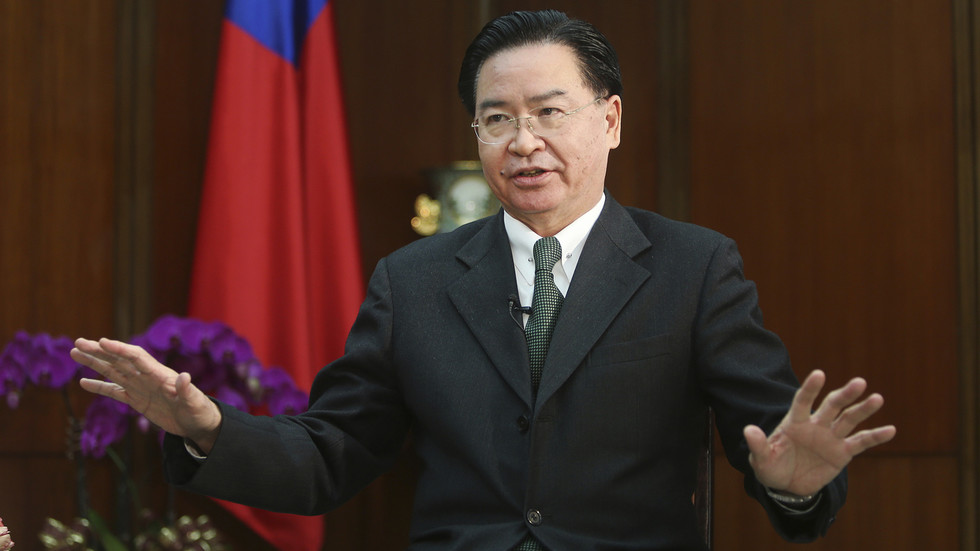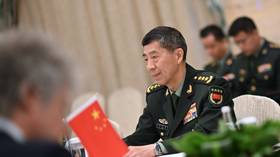
Taiwan’s top ‘diplomat’s’ controversial Euro Trip could overstep China’s red line

Bradley Blankenship is an American journalist, columnist and political commentator. He has a syndicated column at CGTN and is a freelance reporter for international news agencies including Xinhua News Agency.
Bradley Blankenship is an American journalist, columnist and political commentator. He has a syndicated column at CGTN and is a freelance reporter for international news agencies including Xinhua News Agency.
@BradBlank_

Taiwan’s Foreign Minister Joseph Wu © AP Photo/Chiang Ying-ying
Taiwan’s so-called “Foreign Minister” Joseph Wu spoke at the 2023 European Values Summit in Prague earlier this month, saying that the island, which is internationally recognized as part of China, wants to maintain the current status quo and secure peace and stability. To accomplish this, Wu explained that Taiwan would require help from European countries.
“In order for Taiwan to stay strong and resilient and to have the courage to continue the policy of maintaining the status quo, we do need support from European friends,” Wu said during the summit in Prague after Czech President Petr Pavel delivered opening remarks. The not officially-recognized diplomat then went on to visit Brussels, the headquarters of the European Union, where he spoke to members of the European Parliament, including its Vice President Nicola Beer.
What is principally ironic about Wu’s entire appearance is that this itself violates the agreed-upon status quo that any country that establishes bilateral relations with China must necessarily accept, namely some interpretation of the One China policy. To have diplomatic relations with China, a country cannot formally recognize Taiwan as a separate entity or, as its official name, the Republic of China, would suggest, as the legitimate government of China. For the Czech President to host Taiwan’s “foreign minister” and speak directly before him is about as formal as recognition goes.

Read more
Is it really in the interest of the EU or the Czech Republic to torch relations with China just to pursue an idealistic partnership with Taiwan? Of course it isn’t. In fact, the potential pay-off of a partnership with Taiwan has been massively overhyped and the Central and Eastern European region has been one of the premier battlegrounds for Beijing vs. Taipei in the international scene for some time.
This was best demonstrated through the formation and subsequent dissolution of the 16+1 format aimed at encouraging cooperation between China, countries on the EU’s eastern flank, and the Western Balkans. The countries which have benefited most from this format and shored up huge investments from the Belt and Road Initiative (BRI) are primarily not EU members and do not have civil societies that are overwhelmingly anti-communist, nationalistic and reactionary.
Serbia, for instance, saw the construction of a “friendship bridge” over the Danube River, which was opened in 2014. In 2021, Belgrade signed a contract for new wastewater treatment plants across 65 municipalities and, in 2022, penned further deals for another bridge and a brand-new highway.
Montenegro has an ongoing project with China to build a highway linking its main port to its interior and to neighboring Serbia, which has drawn widespread criticism from the EU over debt concerns. Undeterred, the small country signed another deal this year for a second highway along the coast.
By contrast, Hungary, which has tried to engage positively with Beijing, saw the EU string up investment opportunities. The EU once took aim at the legality of the tender process for the Hungarian section of a high-speed railway line between Belgrade and Budapest. Meanwhile, the Czech Republic under former president Milos Zeman was promised some 60 billion Czech crowns ($2.73 billion) in investment projects from China but most of these never materialized and journalists started criticizing the proposals as hollow. It is hard to say what happened in each and every case of investment, but negative perceptions of China likely played a significant role.

Read more
Through the course of 2021 and 2022, the format shrank to 13+1 after Lithuania, Estonia and finally Latvia withdrew from the cooperation platform. All three countries are among the most radically anti-communist and heavily influenced by the US, which likely played a major role in their inability to amicably negotiate business deals with their Chinese counterparts with their overlords in Washington breathing down their neck.
Having lived in the Czech capital for four years, I can say that the civil society here is intensely influenced by the US. The American propaganda outlet Radio Free Europe is headquartered in Prague, the largest TV station in the country (Prima News) was purchased by CNN, and the English language is becoming ubiquitous. Even one of the largest lobbying organizations in the country – the one where President Pavel and “Foreign Minister” Wu spoke – is nearly 37% funded by US government agencies, such as the State Department and USAID.
The goal of the US is clear: It wants its immature, new European republic proxies to spit in China’s face to the point where they aren’t even expected to follow official US policy, namely the One China policy. They’re supposed to actually up the ante by essentially recognizing Taiwan as independent, getting a proper diplomatic whipping from Beijing, crying to Washington and then being “saved” by it. This is an extremely typical chain of events that seemingly repeats without end, with the Czech Republic and Baltic States playing the part of the eternal victim.
The thing is this situation is only good for a tiny swath of elites in these countries. It helps them maintain their positions of power by gaining the praise of the pro-US and US-owned media. However, splintering relations with China, the largest trading partner of the European Union, and seeking to replace it with deeper cooperation with the tiny island of Taiwan is a ridiculous strategy. It goes without saying that Taiwan, which has an economy 4% the size of mainland China’s (by nominal GDP), does not have anywhere near the same potential.
The statements, views and opinions expressed in this column are solely those of the author and do not necessarily represent those of RT.




